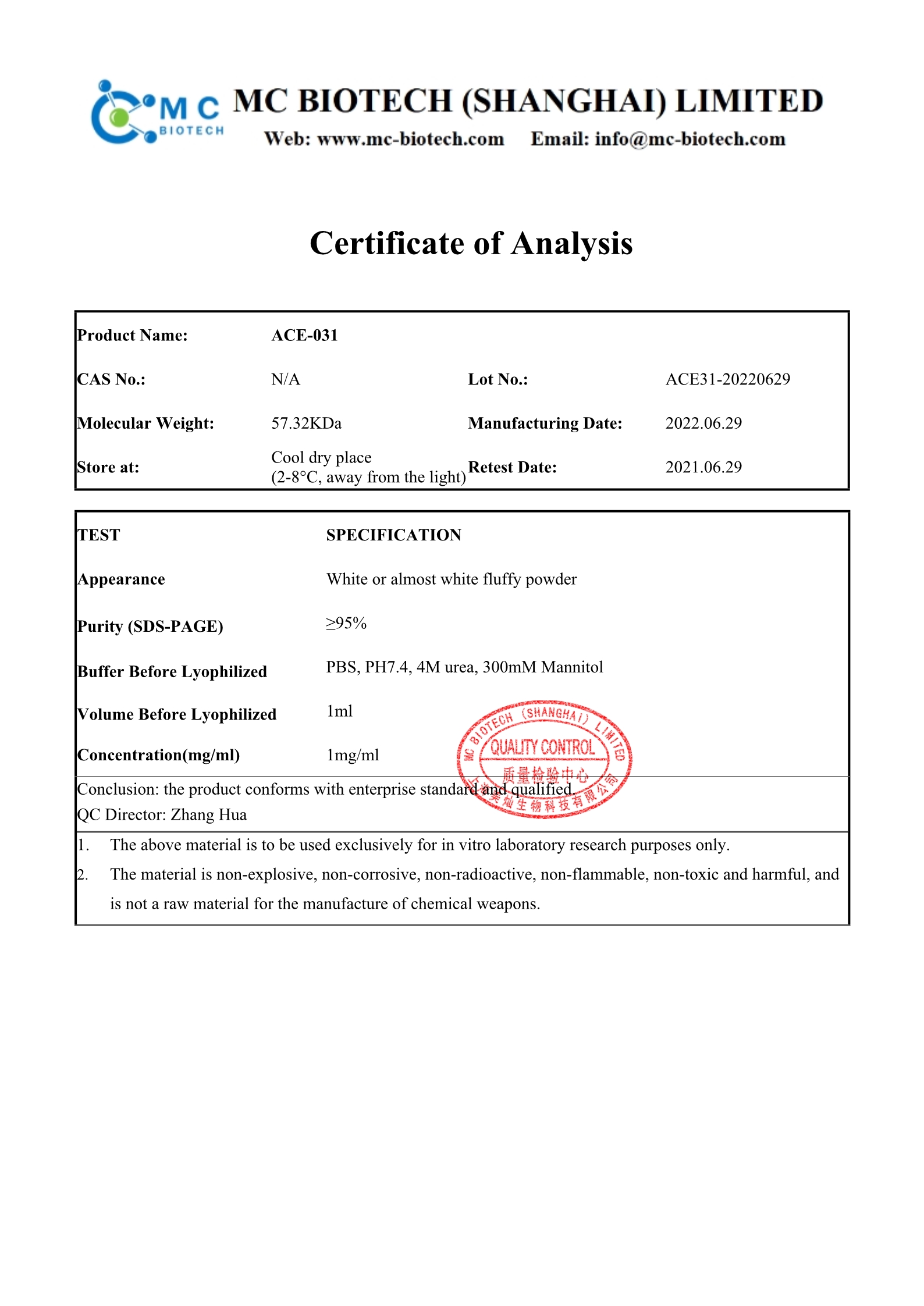ACE-031 is a soluble form of the activin type IIB receptor and is known to bind to myostatin and neutralize its effects.
Name: ACE-031; ACE031; His-tagged ACE-031
CAS No.: N/A
Molecular Weight: 57.32KDa
Appearance: White Lyophilized powder

ACE-031 is a soluble form of the activin type IIB receptor and is known to bind to myostatin and neutralize its effects. Myostatin is a protein, produced by muscle cells, that inhibits both hypertrophy and hyperplasia of skeletal muscle. ACE-031 also likely has effects on bone metabolism, fat storage, and the health of sperm.
ACE-031 is a soluble form of the type IIB activin receptor (ACVR2B), which is a potent regulator of muscle growth in vivo. Myostatin, a negative regulator of muscle growth, is bound by ACVR2B and subsequently inactivated. Research in mouse models shows that knocking out the activin receptor boosts mass in all muscle cells. As a result of this connection, ACE-031 has been investigated in several clinical trials as a potential treatment for muscle-wasting diseases like Duchenne muscular dystrophy (DMD). Activin receptors also play important roles in the development of gametocytes, particularly sperm. The receptor is also often found to be inactivated in prostate cancer and is damaged or dysfunctional in several different types of colorectal cancer.
ACE-031 Research and Muscle Protection After Menopause
ACE-031 was tested in a small clinical trial to determine if it could help to maintain muscle mass in postmenopausal, healthy women. Maintaining muscle is critical to long-term bone health and helps to reduce the rate of joint injuries, falls, etc. in both men and women as they age. In a small placebo-controlled trial, ACE-031 produced significant increases in both lean body mass and thigh muscle volume after just a single dose. Results were observed 29 days after the injection. The study was particularly interesting because a secondary, unexpected outcome was observed. Trials participants receiving ACE-031 showed improvement in serum biomarkers of both bone and fat metabolism. This suggests that ACE-031, while primarily associated with muscle growth, likely inhibits fat storage and boosts bone production.
ACE-031 May Be Necessary for Maximum Muscle Cell Growth
Research in mice indicates that maximal skeletal muscle growth can only be attained with a myostatin inhibitor like ACE-031. Furthermore, it appears that blockade of myostatin by multiple avenues is most beneficial. While these findings are preliminary, they suggest that maximum muscle protection in muscle-wasting conditions might require a multifaceted approach utilizing therapies that both boost growth (growth hormone, IGF-1) and reduce muscle wasting (ACE-031).
ACE-031 Research and Energy Metabolism
Research in mice suggests that myostatin may negatively affect muscle energy metabolism. In other words, too much myostatin leads to extreme muscle fatigue. Blocking the effects of the natural version of ACE-031 in mice leads to elevated serum lactate levels and severe metabolic damage to muscles. It also leads to reduction in the number of blood vessels serving muscle tissue. Supplementing with ACE-031 there not only promotes muscle growth via inhibition of myostatin, it also improves oxidative capacity of muscle, which protects against fatigue and the negative effects of free radical production.
ACE-031 Research and Strength
There appears to be more to the ability of ACE-031 to improve muscle function than inhibition of myostatin. Research in mice indicates that ACE-031 can improve force-generating capacity in muscle tissue, in part by preserving energy supply and shifting muscle thermodynamics toward oxidative respiration. In the mice, administration of ACE-031 improved maximum and total contractile force by 40% and 25% respectively. There was no overall change in fatigue of muscle though, indicating that ACE-031 improves muscle strength without affecting energy dynamics. The research revealed no changes in ATP homeostasis or contractile efficiency.
ACE-031 Tested in Clinical Trials for Muscle Repair
Duchenne muscular dystrophy (DMD) is an x-linked recessive condition characterized by severe muscle loss. It generally leads to an inability to walk by age 12 with muscles that are lacking in protein content but that are exceptionally high in fat content. Due to a dysfunctional dystrophin protein, muscle cells in DMD are weak and prone to damage. Though this is the primary cause of the disease, a secondary effect occurs when myostatin leaks from damaged muscle cells and slows or inhibits growth in other cells. Gene therapy to address the dystrophin dysfunction has so far proved untenable, but there is currently hope that ACE-031 can slow the muscle damage by reducing the secondary impact caused by myostatin.
In a recent clinical trial, subcutaneous injection of ACE-031 every 2-4 weeks resulted in a trend toward maintenance of the 6-minute walk test, indicating that the peptide preserves muscle function. There was also a trend toward increased lean body mass, improve bone mineral density, and reduced fat mass. These latter two findings correlate well with other studies of ACE-031 that suggest it has positive effects on bone and fat metabolism.
Product Usage:THIS PRODUCTIS INTENDED ASARESEARCH CHEMICAL ONLY.
Contact: Sophia Wang
Phone:
E-mail: info@mc-biotech.com
Add: 2nd Floor,ECNU Science Park,No.1006 Jinshajiang Road, Putuo District, Shanghai